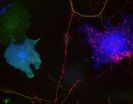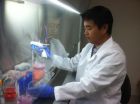(Press-News.org) Synapse development is promoted by a variety of cell adhesion molecules that connect neurons and organize synaptic proteins. Many of these adhesion molecules are linked to neurodevelopmental disorders; mutations in neuroligin and neurexin proteins, for example, are associated with autism and schizophrenia. According to a study in The Journal of Cell Biology, another family of proteins linked to these disorders regulates the function of neuroligins and neurexins in order to suppress the development of inhibitory synapses.
Like neurexins and neuroligins, the neuronal proteins MDGA1 and MDGA2 have been linked to autism and schizophrenia, but their function in neurodevelopment was unknown. Both MDGA proteins localize to the plasma membrane, and their extracellular domains are similar to those of cell adhesion molecules. On the other hand, postsynaptic neuroligin proteins are known to help synapses form by associating with neurexins on presynaptic membranes. Neuroligin-2 specifically boosts the development of inhibitory synapses, whereas neuroligin-1 promotes the development of excitatory synapses.
Ann Marie Craig and colleagues from the University of British Columbia investigated the function of MDGAs using co-culture assays, in which postsynaptic proteins like neuroligin-1 or -2 are expressed in non-neuronal cells and then tested for their ability to induce presynaptic differentiation in neighboring neurons. MDGA1 didn't promote synapse formation in these assays. Instead, it inhibited the ability of neuroligin-2 to promote synapse development. The researchers found that MDGA1's extracellular domains bound to neuroligin-2, blocking its association with neurexin. The same domains were sufficient to inhibit neuroligin-2's synapse-promoting activity. In contrast, MDGA1 didn't show high affinity binding to, or inhibit the function of, neuroligin-1. This suggested that, by inhibiting neuroligin-2, MDGA1 might specifically suppress the development of inhibitory synapses, so Craig and colleagues investigated MDGA1 function in cultured hippocampal neurons.
"Overexpressing MDGA1 in neurons reduced the density of inhibitory synapses without affecting excitatory synapses," Craig says. Knocking down MDGA1, on the other hand, increased inhibitory synapse development but had no effect on excitatory synapses.
"I can't think of any other proteins that specifically suppress inhibitory synapse formation," says Craig. Indeed, very few proteins in general have been identified as negative regulators of synapse development, compared to the many proteins that are known to promote synaptogenesis. The results suggest that function-altering mutations in the MDGA proteins may disrupt the balance of excitatory and inhibitory synapses in the brain, potentially explaining the development of autism and other neurodevelopmental disorders.
"This puts MDGAs in the same pathway as neurexins and neuroligins and strengthens the evidence for the involvement of synaptic organizing proteins in autism and schizophrenia," Craig explains. As well as investigating the function of MDGA2, the researchers want to explore the therapeutic potential of MDGA1 inhibitors, not only against autism and schizophrenia but also for the treatment of epilepsy, in which excitatory and inhibitory synapses are also imbalanced
INFORMATION:
Pettem, K.L., et al. 2013. J. Cell Biol. doi:10.1083/jcb. 201206028
About The Journal of Cell Biology
The Journal of Cell Biology (JCB) is published by The Rockefeller University Press. All editorial decisions on manuscripts submitted are made by active scientists in conjunction with our in-house scientific editors. JCB content is posted to PubMed Central, where it is available to the public for free six months after publication. Authors retain copyright of their published works, and third parties may reuse the content for non-commercial purposes under a creative commons license. For more information, please visit www.jcb.org
Protein family linked to autism suppresses the development of inhibitory synapses
Study identifies potential therapeutic target to treat autism, schizophrenia, and epilepsy
2013-01-28
ELSE PRESS RELEASES FROM THIS DATE:
DNA-repairing protein may be key to preventing recurrence of some cancers
2013-01-28
Just as the body can become resistant to antibiotics, certain methods of killing cancer tumors can end up creating resistant tumor cells. But a University of Central Florida professor has found a protein present in several types of cancer, including breast and ovarian cancer, which could be helpful in preventing tumors from coming back.
The protein, KLF8, appears to protect tumor cells from drugs aimed at killing them and even aid the tumor cells' ability to regenerate.
"All cells have a DNA-repair mechanism," explained Jihe Zhao, a medical doctor and researcher who ...
Global research team decodes genome sequence of 90 chickpea lines
2013-01-28
Hyderabad, India, and Shenzhen, China (28 January 2013) – In a scientific breakthrough that promises improved grain yields and quality, greater drought tolerance and disease resistance, and enhanced genetic diversity, a global research team has completed high-quality sequencing of not one but ninety genomes of chickpea.
Nature Biotechnology, the highest ranked journal in the area of biotechnology, featured the reference genome of the CDC Frontier chickpea variety and genome sequence of 90 cultivated and wild genotypes from 10 different countries, as an online publication ...
Radial access should be first choice for PCI says ESC
2013-01-28
Sophia Antipolis, 28 January 2013: The radial approach for percutaneous coronary interventions (PCI) was developed 20 years ago and is used for more than 50% of procedures in France, Scandinavian countries, the UK, Spain and Italy. Despite the advantages of radial access some countries in Europe such as Germany use radial access for fewer than 10% of PCI.
Evidence has accumulated in the literature showing the benefits of radial over femoral access for PCI including reduced bleeding and improved survival. In addition, the development of smaller and thinner devices has ...
New technique sheds light on RNA
2013-01-28
ANN ARBOR, Mich. — When researchers sequence the RNA of cancer cells, they can compare it to normal cells and see where there is more RNA. That can help lead them to the gene or protein that might be triggering the cancer.
But other than spotting a few known instigators, what does it mean? Is there more RNA because it's synthesizing too quickly or because it's not degrading fast enough? What part of the biological equilibrium is off?
After more than a decade of work, researchers at the University of Michigan Comprehensive Cancer Center have developed a technique to ...
Study finds energy use in cities has global climate effects
2013-01-28
TALLAHASSEE, Fla. ⎯ The heat generated by everyday energy consumption in metropolitan areas is significant enough to influence the character of major atmospheric circulation systems, including the jet stream during winter months, and cause continental-scale surface warming in high latitudes, according to a trio of climate researchers that includes Ming Cai, a professor in Florida State University's Department of Meteorology.
Led by Guang Zhang, a research meteorologist at Scripps Institution of Oceanography at the University of California, San Diego, the scientists ...
University of Tennessee researcher finds 'first time' could predict sexual satisfaction
2013-01-28
Research conducted by Matthew Shaffer, a doctoral psychology student at UT and C. Veronica Smith, an assistant psychology professor at the University of Mississippi, reveals that the first sexual experience can set the tone for the rest of one's sexual life.
The study is published in the Journal of Sex and Marital Therapy and is the first to look at whether the circumstances of losing one's virginity have lasting consequences.
"The loss of virginity is often viewed as an important milestone in human development, signifying a transition to adulthood," said Shaffer. ...
Majority of Americans support dozens of policies to strengthen US gun laws
2013-01-28
The majority of Americans support a broad array of policies to reduce gun violence, according to a new national public opinion survey conducted by researchers at the Johns Hopkins Bloomberg School of Public Health. These policies include: requiring universal background checks for all gun sales (supported by 89 percent); banning the sale of military-style semiautomatic assault weapons (69 percent); banning the sale of large-capacity ammunition magazines (68 percent); and prohibiting high-risk individuals from having guns, including those convicted of a serious crime as a ...
Phone and mailed interventions significantly increase colorectal cancer screening rates
2013-01-28
PHILADELPHIA—A mailing or phone call to help patients get screened for colorectal cancer significantly increases their chances of actually getting tested, according to a study published in the January issue of Cancer Epidemiology, Biomarkers and Prevention by researchers at the Kimmel Cancer Center at Jefferson.
The research team, led by Ronald E. Myers, Ph.D., Professor and Director of Division of Population Science, Department of Medical Oncology at Thomas Jefferson University, performed a randomized, controlled trial of 945 people aged 50-79 to test the impact of a ...
Stanford researchers break million-core supercomputer barrier
2013-01-28
Stanford Engineering's Center for Turbulence Research (CTR) has set a new record in computational science by successfully using a supercomputer with more than one million computing cores to solve a complex fluid dynamics problem—the prediction of noise generated by a supersonic jet engine.
Joseph Nichols, a research associate in the center, worked on the newly installed Sequoia IBM Bluegene/Q system at Lawrence Livermore National Laboratories (LLNL) funded by the Advanced Simulation and Computing (ASC) Program of the National Nuclear Security Administration (NNSA). Sequoia ...
Smart organizations should also be stupid according to new theory
2013-01-28
"We see functional stupidity as the absence of critical reflection. It is a state of unity and consensus that makes employees in an organisation avoid questioning decisions, structures and visions", says Mats Alvesson. "Paradoxically, this sometimes helps to raise productivity in an organisation."
Together with colleague André Spicer, Mats Alvesson has written an article entitled 'A Stupidity-Based Theory of Organisations', which was recently published in the renowned Journal of Management Studies and has been featured in the Financial Times. In the article, he expounds ...
LAST 30 PRESS RELEASES:
Wildfire smoke linked to rise in violent assaults, new 11-year study finds
New technology could use sunlight to break down ‘forever chemicals’
Green hydrogen without forever chemicals and iridium
Billion-DKK grant for research in green transformation of the built environment
For solar power to truly provide affordable energy access, we need to deploy it better
Middle-aged men are most vulnerable to faster aging due to ‘forever chemicals’
Starving cancer: Nutrient deprivation effects on synovial sarcoma
Speaking from the heart: Study identifies key concerns of parenting with an early-onset cardiovascular condition
From the Late Bronze Age to today - Old Irish Goat carries 3,000 years of Irish history
Emerging class of antibiotics to tackle global tuberculosis crisis
Researchers create distortion-resistant energy materials to improve lithium-ion batteries
Scientists create the most detailed molecular map to date of the developing Down syndrome brain
Nutrient uptake gets to the root of roots
Aspirin not a quick fix for preventing bowel cancer
HPV vaccination provides “sustained protection” against cervical cancer
Many post-authorization studies fail to comply with public disclosure rules
GLP-1 drugs combined with healthy lifestyle habits linked with reduced cardiovascular risk among diabetes patients
Solved: New analysis of Apollo Moon samples finally settles debate about lunar magnetic field
University of Birmingham to host national computing center
Play nicely: Children who are not friends connect better through play when given a goal
Surviving the extreme temperatures of the climate crisis calls for a revolution in home and building design
The wild can be ‘death trap’ for rescued animals
New research: Nighttime road traffic noise stresses the heart and blood vessels
Meningococcal B vaccination does not reduce gonorrhoea, trial results show
AAO-HNSF awarded grant to advance age-friendly care in otolaryngology through national initiative
Eight years running: Newsweek names Mayo Clinic ‘World’s Best Hospital’
Coffee waste turned into clean air solution: researchers develop sustainable catalyst to remove toxic hydrogen sulfide
Scientists uncover how engineered biochar and microbes work together to boost plant-based cleanup of cadmium-polluted soils
Engineered biochar could unlock more effective and scalable solutions for soil and water pollution
Differing immune responses in infants may explain increased severity of RSV over SARS-CoV-2
[Press-News.org] Protein family linked to autism suppresses the development of inhibitory synapsesStudy identifies potential therapeutic target to treat autism, schizophrenia, and epilepsy



